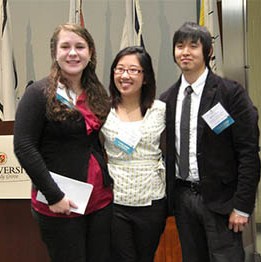 Left to right: Shannon Mitchell, Fatima Sitson, and Kerry Chon at USG in 2011. |
Towson University (TU), the largest producer of teachers on the East Coast, found a home in Montgomery County when the Universities at Shady Grove (USG) opened its doors in 2000. Today, TU’s growing Elementary Education/Special Education (EESE) Integrated Program on the USG campus boasts a 99% graduation rate, equally impressive job placement rate, and strong relationships across education systems that have played a central role in engaging, motivating and cultivating the next generation of quality teachers in Montgomery County.
Valerie Sharpe, Ed.S and EESE Coordinator, credits the success of the EESE program to the collaborative efforts among Maryland institutions and systems -- Montgomery College, Towson University, USG and Montgomery County Public Schools (MCPS). Among the higher education institutions, the partners have committed to a memorandum of understanding to ensure that students experience a seamless transition from community college and into the EESE program with aligned courses. EESE partners with MCPS to provide students with quality classroom training.
"It's a harmonious trade off that takes place across all parties," Sharpe said. "We offer a fluid transition for students moving from community college and into our program. And secondly, our students glean knowledge from teachers representing one of the best public school systems in the nation. In return those teachers learn about cutting-edge best practices that might not have yet filtered down into the public school system."
Towson University at USG works with select MCPS elementary and middle schools to provide student teachers with internships and the professional development experience to fine-tune their pedagogical skills in the classroom. Further, in order to complement the internship experience, EESE provides students with a mentoring program that engages school administrators, such as Central Office personnel of MCPS and veteran teachers who can share their institutional knowledge about the education system.
Fatima Sitson, an EESE graduate who is now entering her third-year of teaching for Montgomery County Public Schools (MCPS), said the program equipped her to enter those first, critical and challenging two years of teaching. Sitson and her peers acknowledge the EESE’s holistic approach to providing students with the tools and skills to succeed in the program and launch their careers.
"I don't think I would have had the opportunity at any other institution or program to have access to experienced professors, a great mentor, internships at Montgomery County Public Schools and so much support to help me start my career," Sitson said. "I'm so grateful for that."
Another value-added component of EESE is its dual certification model. In addition to earning a state-required general teaching certification, EESE students earn a special education certification that qualifies their specialized pedagogical skills. EESE allows students to earn their dual certification in a total of four years, compared to the five or more years other programs require.
EESE’s dual program component has broadened the career options for students like Shannon Mitchell who initially entered the program with little intent of teaching children with special needs.
“At first, I only had imagined being a general education teacher, but through the program I was able to broaden my career options and gain perspective about different types of teaching,” Mitchell said. “Being able to see the way those children transformed really inspired me to teach children with special needs.”
Mitchell now teaches self-contained special education classes in all subject areas for MCPS.
Kerry Chon, an ESE graduate, interacted often with his mentor, who he still keeps in touch with today.
“I could email late at night or ask them last minute for coffee, and they would find a way to provide support,” Chon said. “The endless support from mentors and the professors were definitely a big part of what made the EESE program so special.”
Sharpe says the program was designed to provide students with a strong foundation for their teaching career. Students are trained through many mock interviews conducted by active education administrators and are acquainted with a mix of education professional organizations that provide support and resources as they continue.
“We want to get them off on a strong start and make sure they have the confidence and ability to succeed when they leave the program, but students know that we will have a relationship that goes well beyond that,” Sharpe said.

